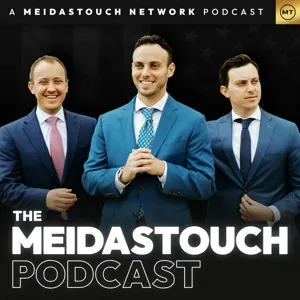Podcast Summary
Power dynamics in fashion and politics: The fashion industry and politics involve complex power struggles and potential threats to democratic institutions.
The fashion industry, worth trillions of dollars, is not just about glamour and stars, but also involves complex power dynamics and potential controversies. Meanwhile, in the political sphere, concerns about the potential misuse of power are on the rise. In a recent article, it was revealed that former President Trump and his allies are planning to increase presidential power in a potential second term, which raises serious questions about the balance of power in the United States government. This comes after Trump's first term, which saw accusations of attempts to subvert independent government agencies and even an insurrection at the Capitol. It's a reminder that behind the scenes of both the fashion and political worlds, there can be significant power struggles and potential threats to democratic institutions.
Discussion on potential dangers of political control over regulatory agencies and media's role in holding power accountable: Staying informed and vigilant is crucial to protect democratic institutions from potential power grabs by political figures. Media plays a key role in communicating complex issues and holding those in power accountable.
The current political climate in the United States raises concerns about the potential erosion of democratic institutions and checks on executive power. The discussion highlights the potential dangers of putting key regulatory agencies under direct political control and the possibility of a power grab by political figures. The media's role in holding those in power accountable and communicating complex issues to the public was also emphasized. A specific example was given regarding the New York Times article on Trump's alleged plans to increase presidential power in 2025, which was criticized for understating the potential implications of such a move. The conversation also touched on the ongoing SAG-AFTRA strike and its potential financial impact. Overall, the conversation underscores the importance of staying informed and vigilant in the face of potential threats to democratic institutions and the role of the media in informing the public.
Labor Disputes and Their Financial Implications: The ongoing writers' strike and potential UPS workers' strike highlight the significant financial stakes involved in labor disputes. Actors and writers seek fair compensation, potentially disrupting the industry and economy, while UPS workers' strike could impact the economy and the Biden administration's relationship with the labor union.
The ongoing writers' strike and the potential UPS workers' strike highlight the significant financial stakes involved in labor disputes. In the case of the writers' strike, the issue revolves around streaming royalties and residuals, which are much lower than in linear television due to the business model of selling content once and profiting from it indefinitely. Actors and writers are advocating for livable wages, leading to a lengthy strike that could change the industry's landscape. Meanwhile, the UPS workers' strike, involving 340,000 employees, could impact the economy and the Biden administration's relationship with the labor union. The Teamsters' request for the White House to stay out of the matter underscores the potential consequences of intervention. Both strikes underscore the importance of fair compensation and the potential disruption to industries and economies when labor disputes arise.
Balancing labor relations and commerce in corporations vs addressing societal concerns for sex workers and ancient Roman concrete: Large corporations must navigate labor relations while maintaining a functional economy, ensuring worker satisfaction, and keeping commerce moving. Simultaneously, societal concerns for sex workers' safety and the durability of ancient Roman concrete remind us of the importance of addressing overlooked issues.
Navigating labor relations in large corporations, using the example of UPS and its dealings with unions, presents a complex challenge. On one hand, ensuring worker satisfaction is crucial for maintaining a functional economy. On the other hand, keeping commerce moving is equally important for consumers. Meanwhile, in a separate yet related issue, the risk of violence towards sex workers, particularly women, is a significant concern that often goes unaddressed due to their illegal status and societal stigma. Lastly, the durability of ancient Roman concrete, a topic covered in a Science Alert article, serves as a fascinating reminder of engineering feats from the past and the ongoing quest for sustainable construction materials.
Ancient Roman concrete heals itself: Ancient Roman concrete's self-healing properties could lead to an eco-friendly alternative to modern concrete, reducing greenhouse gas emissions.
Ancient Roman concrete, made differently than modern concrete, has self-healing properties. Researchers discovered that the Romans used lime at higher heat, which causes the concrete to react with water and fill in cracks when they form. This finding could lead to a more environmentally friendly alternative to current concrete, which is a significant producer of greenhouse gases. On a positive note, the CDC reported that the total number of Americans dying each day from any cause is no longer historically abnormal. During the pandemic, excess deaths were over 30% higher than normal, but now they are almost back to normal levels. This is great news, and it's happening in other countries as well. People are vaccinated and taking necessary precautions. These developments are reasons to be hopeful and grateful.
Investigating literacy education struggles in the US: The podcast emphasizes the need to improve literacy education in the US and calls for renewed focus, as similar struggles are seen in various regions like Wisconsin and New York.
There's a pressing need to improve literacy education in the United States, as highlighted in the podcast "Soul the Story." The podcast investigates how reading instruction has gone awry and calls for a renewed focus on this essential skill. Schools across the country, including Wisconsin, are making changes to their teaching methods. The speaker, who was influenced by the podcast, urges everyone to listen and share the message. The podcast's insights reveal that this issue is not unique to Wisconsin or even just the U.S., as similar struggles have been seen in places like New York. Overall, the podcast underscores the importance of addressing literacy instruction and inspires action towards positive change.






